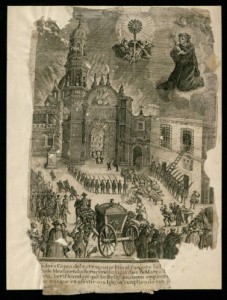
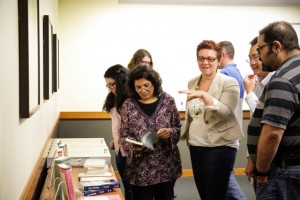
Attendees and panelists mingle, discuss, and view some of Mena’s works. Additional photos of last month’s event can be viewed here. (Photo courtesy of Mauricio Lazo, University of Houston Libraries.)
Last month Arte Público Press and the University of Houston Special Collections came together to celebrate María Cristina Mena (1893-1965) in an event that honored her writings and highlighted the gift of her papers to our Hispanic Collections. Mena was an author probably most known for her children’s books and short stories, including some published in The Century Magazine and American Magazine from 1913 to 1916 (though she continued to write and publish up until just before her passing in 1965).
The event was held in Special Collections at the MD Anderson Library on campus. Honored guests Amy Doherty Mohr, PhD of Amerika-Institut at Ludwig-Maximilians-Universität Munich; José Aranda, PhD of Rice University, Department of English; and Carolina A. Villarroel, PhD of Arte Público Press and the Recovering the U.S. Hispanic Literary Heritage Project, served as panelists for the event which was moderated by Lisa Cruces, Archivist for our Hispanic Collections.
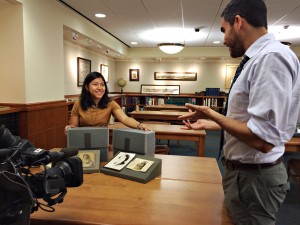
Hispanic Collections Archivist Lisa Cruces highlights the María Cristina Mena Papers for the cameras of Houston Public Media.
Some of the major themes in Mena’s works include beauty (and plastic surgery), language, stereotypes, and women and romance. In her stories, these themes were often used to explore aspects of the Mexican and American components of her Chicana/o heritage, especially the intersections in which these two components collided. Attendees had an opportunity to hear from a wide array of panelists, both local and virtual (in the case of Dr. Mohr who was able to join the conference from Munich), whose research interests were able to provide more context and definition to Mena’s writing, life, and place among the literary output of the 20th century. “Thrilled” with this new addition and its research potential, Cruces notes, “The Mena Papers offer a wealth of information ranging from insight on experiences of female authors in the early 20th century to the literary depiction of the Mexican Revolution abroad.”
Our thanks to all who helped make the event a success. The María Cristina Mena Papers, part of our larger Hispanic Collections, are available for research in the University of Houston Special Collections Reading Room.
On this San Jacinto Day, the University of Houston Special Collections is happy to share more exciting developments on the digitization front with the recent publication of the Mexico Documents Collection on the UH Digital Library.
Originally combined from several smaller collections, the Mexico Documents Collection contains government orders, announcements, decrees, pamphlets, and correspondence (both personal and official) dating as far back as 1570 (manuscript on vellum) on into the 20th century. Many of the materials in the collection date from Mexican Independence (1821) through the end of the Mexican-American War (1849), but scholars with research interests in the Mexican Colonial Period or the Mexican Revolution are also likely to find some fertile ground in this collection. Researchers with limited experience in the Spanish language will also be pleased to find a number of the documents accompanied by English translations.
Thanks to this new level of access, scholars around the globe and around the clock browsing through the online collection will turn up the names of Santa Anna de Lopez, Porfirio Diaz, and Jose Joaquin de Hererra. A closer look reveals materials related to American military actions as part of the Mexican-American War, business and land transactions, as well as documents chronicling religion in Mexico.
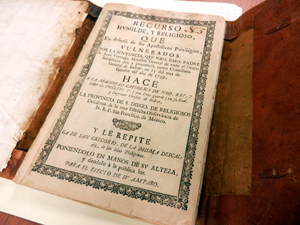
petition from the Barefoot Monks to Philip V, King of Spain (1739, from the Mexico Documents Collection)
While nothing can replicate working with a physical copy of a petition from the Barefoot Monks to Philip V of Spain in the Special Collections Reading Room, the opportunity to share online these types of centuries-old documents alongside more recent materials highlighting distinct periods of Mexican history marks another exciting step for our larger Hispanic Collections. We invite you to enjoy the Mexico Documents Collection and look forward to assisting you in your research, whether online via the Digital Library or offline next time you are able to pay us a visit.
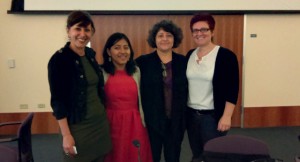
Dr. Maria Cotera (left) alongside panelists Lisa Cruces, Patricia Hernandez, and Dr. Carolina Villaroel
The University of Houston recently hosted Dr. Maria Cotera of the University of Michigan and her talk, “Decolonizing the Archive: Chicana por mi Raza and the Challenge of Digital Humanities.” Dr. Cotera’s talk focused on her work with Chicana por mi Raza, a public humanities project centered on the collection and digital preservation of archival materials, ephemera, and oral histories that document the development of Chicana feminist thought during the civil rights era. A panel discussion, “Pushing Back: Chicana, Latina, Hispanic Women Preserving our Narratives,” followed Cotera’s talk and featured the founder of Studio One Archive Resource, Patricia Hernandez, Director of Research for Arte Público Press, Dr. Carolina Villaroel, and the first Hispanic Collections Archivist at the University of Houston, our own Lisa Cruces.
Sponsored by a number of organizations on and off campus, Dr. Cotera’s talk was broadly attended and included students, staff, and faculty from UH as well as local universities and high schools. The “digital turn,” Dr. Cotera argues, has allowed for a certain de-centering of authority in the work of scholarly research and the Chicana por mi Raza project establishes a collaborative venue providing broad-based public access to oral histories, correspondence, and out-of-print publications for scholarly research in and out of the classroom. Her work with Chicana por mi Raza represents a challenge to the pedagogy and influence of archival politics, prejudices, and patriarchal legacy of the existing structure. The result is a democratization of the archives and an engagement with communities that have been underrepresented in more traditional research models.
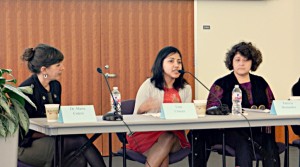
Lisa Cruces (center), Archivist for the Hispanic Collections, addresses a question from the audience during the panel discussion
The panel that followed provided attendees an opportunity to ask questions and hear from women in the field with a variety of traditional and non-traditional archival backgrounds address the subtleties, nuance, and challenges of preserving the historical narratives in this new landscape. As Archivist for the Hispanic Collections here at UH, Cruces certainly has faith in aspects of the traditional archival models, but pointed out that Cotera’s work necessitates the bringing together of multiple vested interests and provides a great opportunity to partner with members of the community outside of the traditional institutional walls. In turn, this work allows a means of introduction to the archives while also allowing participants to look critically as to how historical memory is collected.
If you are interested in the collection and preservation of that historical memory, we encourage you to visit our Hispanic Collections at the University of Houston Special Collections.

petition from the Barefoot Monks to Philip V, King of Spain (1739, from the Mexico Documents Collection)
Today marks the kickoff of National Hispanic American Heritage Month 2014.
From September 15 through October 15, we celebrate the history, culture, and contributions of Americans whose ancestry derives from Spain, Mexico, the Caribbean, and Central and South America. The month, in actuality a 30-day period spanning two months, owes its unorthodox time frame to its origins (originally a week-long observation started under President Lyndon B. Johnson, it was expanded to a month under President Ronald Reagan) and to historical convenience (the first days coincide with the independence celebrations of Costa Rica, El Salvador, Guatemala, Honduras, Nicaragua, Mexico, and Chile and the final days encompass Columbus Day or Día de la Raza). During this time, the Library of Congress in partnership with a number of archives, repositories, and various organizations sponsor exhibits and collections dedicated to telling the story of Hispanic American history.
Here at the University of Houston Special Collections, we celebrate the opportunity to be part of that collective voice as we make available for study our Hispanic Collections. Rich with research potential and always in-demand from scholars, highlights from the collections include the Alonso S. Perales Papers (diplomat, civil-rights lawyer, and one of the founders of LULAC), the Leonor Villegas de Magnón Papers (educator and founder of La Cruz Blanca), and the Mexico Documents Collection (holding manuscript materials dating as far back as 1570). A collection that should increase in its value to researchers over the years are the sizable Arte Público Press Records (the oldest and largest Latino publishing house in the U.S., based here at the University of Houston) and materials related to their award-winning work with the Recovering the U.S. Hispanic Literary Heritage Project.
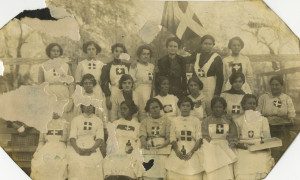
Leonor and ladies of Cruz Blanca 1st brigade (Leonor Villegas de Magnón Papers and also available in our Digital Library)
Over the next month we will take a closer look at the impact of these collections on scholarship related to Hispanic American history. We encourage you, in your own observations over the next month and all year long, to visit UH Special Collections and experience the archives holding that rich history.
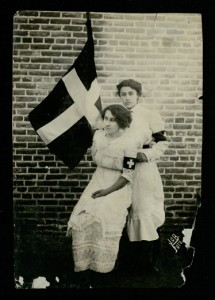
Leonor Villegas de Magnón and Aracelito Garcia with flag of La Cruz Blanca (Leonor Villegas de Magnón Papers, 1914)
Another on the list of recently published digital collections–Photographs from the Leonor Villegas de Magnón Papers.
Previously, we have written about the larger Leonor Villegas de Magnón Papers and how pleased we are that our partnership with Arte Público has made available for study the papers of such a trailblazing, radical Latina. The recent publication of this digital collection, featuring select photographs, will provide prospective researchers a new window into a figure much obscured from our predominant Texana narrative.
Born in Nuevo Laredo, Mexico in 1876, Leonor Villegas de Magnón would lead a life that, for a woman of her time, place, and disposition, found her pushing headlong into a fierce, at times unfriendly current of history in the American Southwest. Educated in San Antonio and Austin, Texas, Magnón would take up permanent residence in Laredo and is remembered today as an educator, journalist, activist, and the founder of La Cruz Blanca (The White Cross) during the Mexican Revolution in 1913 (following in the tradition of other voluntary relief organizations being established to nurse the wounded of war). Her remarkable life is documented in her autobiography, La Rebelde (the Lady Rebel).
Included in this new digital collection are portraits, landscapes, and photographs showcasing her work in the Mexican Revolution as well as candid photographs featuring her family and friends. Notable figures like Porfirio Díaz, Jovita Idar, and Pancho Villa, can be found throughout the collection.
We hope you enjoy this new digital collection of photographs and invite you to visit the Special Collections Reading Room should you wish to further explore the Leonor Villegas de Magnón Papers.
